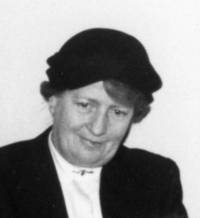


Her scientific Career began at the Kaiser Wilhelm Institute for Silicate Research and ended with early retirement. Luise Holzapfel researched organic silicic acid compounds as well as the dust lung disease silicosis.
Luise Holzapfel was born on March 14, 1900 in Höxter an der Weser and grew up in a middle-class family of lawyers. Her father Wilhelm Holzapfel was a member of the government, her mother Elsa had no job. Holzapfel did not pass the Abitur, which was unusual for young women at the time, at an evening grammar school in Berlin at the age of 29. From 1929 to 1934 she studied chemistry, Physics, technology and economics at the Friedrich Wilhelms University in Berlin. In October 1936 she was the first woman to receive her doctorate from the new mathematics and natural science faculty. Her doctoral thesis was entitled "On the photochemical combustion of carbon oxide".
In 1939 Holzapfel got a job as a research assistant at the Kaiser Wilhelm Institute for Silicate Research in Berlin-Dahlem. There she completed her habilitation in 1943 with a thesis on the subject of "Organic Silica Compounds". In the following year she was appointed lecturer and from 1945 she headed a department at the Kaiser Wilhelm Institute for Silicate Research, where she continued to work on organic silica compounds. With the transition of the West German institutes of the Kaiser Wilhelm Society to the Max Planck Society, Holzapfel's department was incorporated into the Würzburg Max Planck Institute for Silicate Research as a branch in 1952, but had to close ten years later for cost reasons. Holzapfel was given early retirement in 1963.
In addition to her fundamental contributions to organic silicon compounds, Holzapfel made a name for herself as a researcher into silicosis, the quartz dust lung, which is now recognized as an occupational disease. The association ?Natur und Technik?, based in her hometown of Höxter, chose the silicate researcher as the namesake for its MINT competition (MINT stands for mathematics, Computer Science, natural sciences and technology), in which children and young people can win the Luise Holzapfel Prize.
Luise Holzapfel died after a serious illness on September 21, 1963 in Berlin.
a notice
The texts published in this series do not claim to be scientific publications. Authors and other people involved are not experts in the history of science. The purpose of the series is to introduce the mostly unknown women chemists and to remind you of the well-known women chemists. We encourage readers who want to know more to study academic Literature on the women featured. In some cases there are detailed chemical-historical works.
authors
Prof. Dr. Eberhard Ehlers
Prof. Dr. Heribert Offermanns
Editorial processing
Dr Uta Neubauer
project management
Dr Karin J. Schmitz (GDCh public relations)
The authors are responsible for the content of the biographies.
The content presented on these pages has been carefully compiled. However, the authors, Editorial staff and publishers assume no responsibility or liability for the completeness and correctness of the content or for typographical errors.
Photo: Archive of the Max Planck Society, Berlin-Dahlem
back to overview biographies of women chemists
back to publications
This page has been machine translated. If you have any feedback or comments please feel free to contact us. 
last modified: 10.05.2021 16:19 H from N/A